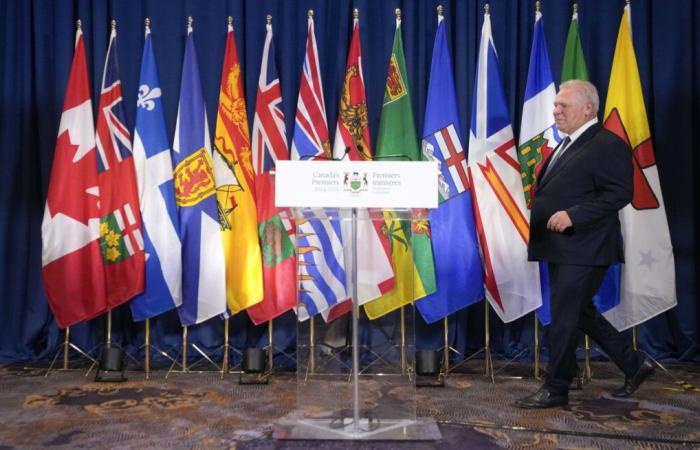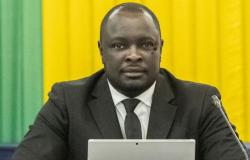To the surprise of many, Ontario Premier Doug Ford stood out for his reaction to Donald Trump’s threats to impose tariffs on Canada, or even annex the country. It now remains to be seen whether he will take advantage of this burst of dynamism to launch provincial elections before the federal elections.
“When Doug Ford looks at Donald Trump, he sees an opportunity,” said Martin Regg, political columnist at the end of December. Toronto Star. Tensions with the future American president could help the Ontario premier get re-elected, he pointed out. Then, this week, he said again: “Don’t do it, Doug Ford. Don’t give us a double electoral problem. »
Hot on his heels by journalists, the Prime Minister refused to rule out this scenario. Ontarians have until June 2026 to return to the polls.
Because Doug Ford already wanted to launch elections in his province before holding federal elections became inevitable, underlines Stéphanie Chouinard, associate professor of political science at the Royal Military College in Kingston. He had also prepared the ground by announcing that all Ontarians would receive a check for $200 in 2025 to offset the increase in the cost of living.
But if he moves forward, he risks further weakening Ontario in the face of the Trump threat, argues columnist Regg.
Justin Trudeau finally gave an interview to CNN on Thursday, and the premiers of other provinces announced that they would travel to Washington on February 12. But before, Doug Ford was practically the only one to occupy the media space in response to Trump. “With the chaos currently reigning among the Liberals, he seized the opportunity to try to save the furniture, at least for his own province,” observes Mme Chouinard.
While François Legault remained silent, the Ontario Prime Minister responded with aplomb Monday to Donald Trump’s reaction to Justin Trudeau’s resignation, even going so far as to joke that Canada could annex Minnesota and the ‘Alaska. That evening, he was on conservative news channel Fox News to tell Americans that he “appreciated” them, but that land north of the border “wasn’t for sale.”
Why think about elections?
But why call an election now? To take advantage of the window available to him before an embarrassing case comes back into the news, explains Professor Chouinard. “Beyond the issue of tariffs, Mr. Ford has a sword of Damocles hanging over his head, namely the RCMP investigation into the Greenbelt of the Ontario. »
The Royal Canadian Mounted Police (RCMP) criminal investigation was launched in the fall after two reports found the Ford government favored developers in its plan to allow buildings to be built in the Greenbelt Ontario. Two ministers have already resigned in connection with this affair. “We do not know when the results of this investigation will be known, but we suspect that it will not be pleasant news for the Progressive Conservative Party,” continues Ms.me Chouinard.
It’s a real dilemma, according to Geneviève Tellier, full professor at the School of Political Studies at the University of Ottawa. “Ford wanted to be re-elected before Poilievre was elected,” following the famous adage stating that Ontarians only elect Conservatives to Queen’s Park when the Liberals are in power at the federal level.
However, the instability in Ottawa could force him not to call an election, she adds. This decision could, however, benefit him in the long term, because “people could say that he has put politics aside to prioritize the higher interests of the province,” notes Professor Tellier.
In the meantime, the Premier of Ontario still enjoys a comfortable majority at Queen’s Park, with 83 seats, far ahead of the New Democratic Party and its 31 seats. According to the latest Abacus poll, conducted in December, he is ahead of the Liberals by 18 percentage points in voting intentions, and the New Democrats by 22 points.
No “new Doug Ford”
One thing is certain, it is not a new Doug Ford that we see shining these days in the media spotlight, according to Geneviève Tellier, nor a reinvented version of the politician.
If it seems omnipresent, it is first of all a sign of panic, she argues. “He is extremely nervous. […] Its entire policy is based around the automobile. » Again this week, during his press conference, Donald Trump explicitly targeted the Ontario auto industry by declaring that Americans “don’t need” vehicles produced in Canada.
Doug Ford’s media offensive on the issue began well before the announcement of Justin Trudeau’s departure, and it had already been activated before Trump’s first threats to impose 25% tariffs, in October , note Mme Tellier. In December, the Ontario government also launched a television advertisement extolling the merits of the “historic partnership” between Ontario and the United States.
From a more concrete point of view, the Ontario Prime Minister this week proposed to Donald Trump to swap tariff increases for a new energy alliance by offering him privileged access to its nuclear production.
An effective strategy?
But if the visibility of the Ontario leader is indisputable, what about his effectiveness? Does it really help to reduce the threat?
Professors Tellier and Chouinard both believe that Doug Ford is very adept at speaking to the American people. He “speaks their language”, notes Mme Tellier, with a speech “on the cow floor” to make them understand “that there are people who will lose their jobs tomorrow morning” if the threat of tariffs is confirmed.
As for the lobbying he says he is doing with American governors, that remains to be demonstrated, she continues.
And what about his colleagues from Quebec, Alberta and elsewhere? Could they take offense? Those around François Legault note that it is normal for Mr. Ford to be very present in the media, particularly because he is president of the Council of the Federation. At the time when François Legault had this role, it was he who was the spokesperson on the issue of health transfers, points out his office.
It doesn’t seem to bother his provincial colleagues “for the moment,” notes Mme Tellier. But “it could” start to “annoy” François Legault if the sole interests of Ontario are put too much at the forefront. “Because Doug Ford preaches for his parish. […] Is its proposal for energy integration with the Americans what Quebec wants? »
At the same time, Mr. Legault could not do what Mr. Ford does on the media level, adds Mr.me Chouinard. “I don’t know if he would be as comfortable as Doug Ford appearing in front of American media in the English language. »
Conversely, we can think, she says, that Quebec can use more discreet strategies more effectively. He has always been “very strong in ‘paradiplomacy’”. The Quebec offices act as “quasi-embassies” in Washington, New York and elsewhere, and have no Ontario equivalents, she observes. “We can think that these channels were activated to protect the interests of Quebec. »






